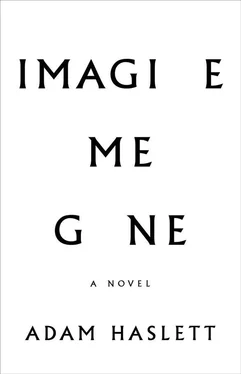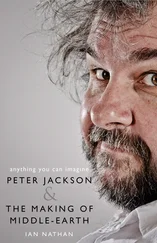I didn’t understand what his flatmate was saying when I called the day I got back to London and he told me that John had been admitted to the hospital.
“Has he had an accident?” I said.
“No,” he said. “But perhaps you should call his parents.”
I phoned right away. His mother handed the receiver to her husband with barely a word. “Yes,” he said. “We were rather hoping all this business was done with. His mother finds it most unpleasant.”
I had nothing to prepare me. John sat in what looked like an enormous waiting room with clusters of chairs and coffee tables, all those waiting being men, most of them reading newspapers or playing cards or just gazing through the filmy windows. His face was so drained of spirit I barely recognized him. If he hadn’t moved his eyes I would have thought he was dead.
The room got only northern light and the shades were half pulled. It just made no sense to stay in that tepid, dingy atmosphere so I said, “Why don’t we go for a walk?” I had to leave there to plant my feet back in reality, and to bring him with me.
Of course it wasn’t that simple. It turned out this wasn’t the first time he’d been hospitalized. His second year at Oxford he’d had to leave for a term. Since then — almost ten years — he’d been generally fine. He’d been the man I’d met. Now, utterly unlike that person, he barely spoke. He just held my hand as we walked through Hyde Park, the ghost of John in John’s frame.
He had to rest, he said. He was tired. That was all. But I knew that couldn’t be it, or was only half true. Being the pushy American, I made an appointment to see his doctor. This was most surprising to the staff, “But all right then,” he would speak with me.
I remember the man’s blue checked cardigan and square glasses, and his thick black hair brushed back with Brylcreem. I couldn’t tell if the room where we met was his office or just a space for meetings off the ward. The books on the shelves were arranged in desultory fashion and there were no diplomas on the walls. But he seemed comfortable and settled there and offered me a smoke before showing me to the couch. He sat opposite and attended mostly to the tip of his cigarette, which he flicked frequently against the rim of the sea-green ashtray nestled in its tarnished brass stand.
“He’s doing reasonably well,” he said, glancing upward with a slight nod of the head, hoping perhaps that would settle it.
“But why is he here? Can you tell me that?”
“How long have the two of you been together?”
“A year and a half.”
He thought about this for a moment, as if deciding how to proceed.
“There’s an imbalance,” he said, crossing his legs and resting the hand that held the cigarette on his knee. He wore cuffed wool pants and brown leather brogues. He must have been twice my age. Between the absence of any white lab coat and the slow, considered pace of his conversation he struck me as a professor more than a doctor.
“You could say his mind closes down. It goes into a sort of hibernation. He needs rest and sometimes a bit of waking up, which may not be necessary right now, but which we can do if it becomes so.”
“And it’s happened before.”
“Yes, it would have done.”
“And that means it’ll happen again?”
“Hard to say. It could well do. But these things aren’t predictable. Stability, family — those things help.”
I think that’s when I was closest to crying. I hadn’t spoken to anyone about what was happening. Not more than to mention and excuse it in the same breath, to say that all was well. But in that room with that man whose English kindliness undid something in me, I suddenly felt afraid and homesick, and probably I did cry for a moment. “We’re supposed to get married this spring,” I said.
He tapped his cigarette again against the lip of the ashtray, then slowly changed the cross of his legs, his shoulders and head remaining perfectly still. He pondered my statement for such a long time that I wondered if he’d heard me. Then he looked up with gentle eyes and asked, “In that case I presume you love him?”
I nodded.
“Well, then, that’s as it should be,” he said.
I went to the ward in Lambeth every afternoon and we took a walk together, even if it was raining. The light in that room was a kind of malpractice. I never saw or spoke to the doctor again. It was hard to get information from anyone. Asking questions wasn’t the proper form. It was the same way a couple of years later when I gave birth to Michael at St. Thomas’s, everyone perfectly pleasant but with nothing but blandishments to offer.
John stayed on the ward for a month. His father visited once, his mother not at all (John was perfect, and she wanted nothing to do with evidence to the contrary). I don’t know what he told his roommates or managers, but it wasn’t that he’d been in a psychiatric hospital. Often during that month I didn’t know which was worse, his dark mood or the shame and frustration it caused him. And he didn’t want to talk about the particulars with me.
I decided not to tell my parents. And certainly not my friends, because they would only worry. My sister, Penny, I did confide in, but swore her to secrecy. In an odd way I felt closer to John. I was the only one who visited regularly, and though it was a strain to be making decisions about a wedding when he barely had the energy to read the news — having to wonder what kind of shape he’d be in by then — there was something about those walks in the park, perhaps precisely because he didn’t talk a blue streak as he usually did, that added a kind of gravity to being in love with him. I’d always wondered before if the mystery that made the beginning of romance enthralling necessarily had to vanish, or if with the right person it just lasted on. I couldn’t have imagined the answer would come in this form, so tied up with trepidation and anger at him for disappearing, in a sense, leaving me with this remnant of himself, but there it was, a mystery deeper than I had guessed at. All his animation and verve could vanish like the weather and stay lost, but then somehow, after six weeks or so, return with such self-forgetting that he didn’t see anything strange about how blithely he led me by the arm into a car showroom to look at MGs, and then took me out to lunch and a bottle of wine, as if nothing had ever happened.
In the fifteen years of our marriage, he’s never gone back to a hospital or come anywhere close, in fact. He’s never had to stop working, or gone nearly so low as he did that fall. He has moods, and occasionally a stretch of a few weeks when I notice his energy flagging, and I don’t suppose I’ll ever be able to rid myself of the worry I have then, that it will all get much worse. Which is part of what keeps the mystery between us going. You could call that perverse. Fear playing that role. But it’s not only fear, and what’s hard to explain is that the fear is also a kind of tenderness. I’m the only one who knows in the way I do that he needs someone to watch over him. At the worst moments, when the children are tired and the house is a mess and I see from the pace of his walk up the drive at the end of the day that he’s at a lower ebb, it can seem no better than having a fourth child and I want to walk straight out the door and not come back for a month. But most of the time it’s not like that. I may not be able to tell what he’s thinking, but he reaches for me. And the excitement from the beginning fills me again at those moments. I don’t see how it could if I understood him through and through.
Seventeen years together. Three children.
And here we are, the five of us, floating up Route 1 in this boat of a car, the children beginning to scramble again in the back: Michael calling out additions to his list of a hundred names for Kelsey ending in ator —the eviscerator, the nebulator, the constipator — all of which she answers to from the bucket seat, yelping in response, having ears only for the tone of a voice, causing Celia to climb over the backseat to protect her from Michael’s mockery, while Alec stands up behind his father’s seat and reaches his hand around to play with John’s double chin, asking how much longer it’s going to be, all of them their father’s impatient children.
Читать дальше












